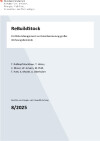Suchergebnisse für "Factsheet: Energietechnologien gestalten, die für alle sinnvoll und nutzbar sind"
Co-Housing Gutenberg: Integrated Sector Coupling for Shared Living, Energy, and Mobility
The "CoHoGutenberg" project aims to establish a sustainable co-housing model in the rural community of Gutenberg, Styria, by combining sufficiency principles with state-of-the-art energy technologies.
Dialogveranstaltung "Forschungsimpulse": Energieversorgung der Zukunft - Erneuerbare Energien
10. September 2010
MS Wissenschaft, Anlegestation Millennium Tower
Wien, AT
anlässlich des erstmaligen Ankerns des Forschungsschiffes MS Wissenschaft in Wien.
Handbuch Bioenergie-Kleinanlagen (Fachagentur Nachwachsende Rohstoffe e.V., 2003)

Grundlagen über den Einsatz biogener Brennstoffe in Kleinanlagen
Deutsch
Erster Newsletter des D-A-CH-Algen-Netzwerks erschienen
Das „D-A-CH Netzwerk Algen" fördert den Informationsaustausch zwischen Wirtschaft, Wissenschaft und Forschungsförderung der deutschsprachigen Länder. Nun wurde der erste Newsletter veröffentlicht.
Tag der offenen Tür im 1. Europäischen Passivhausdorf zum Probewohnen®
5. Jun 2008
Sonnenplatz Großschönau GmbH, Harmannsteinerstraße 120
A-3922 Großschönau, AT
Klimaaktionstag in NÖ
IEA-SHC Task 47 Positionspaper
Das Position Paper zu IEA Solar Heating and Cooling-Task 47 "Nachhaltige Sanierung von Dienstleistungsgebäuden" ist veröffentlicht und steht zum Download zur Verfügung.
Passivhaus Auleiten (Neuhofen, Oberösterreich)
Flachgedecktes Passivhaus in engparzellierter Siedlungsstruktur
DREI x NULL = NULL - Research project on climate-neutral construction in all life cycle phases based on three demonstration buildings
The aim of the F&E project is the realization of three different residential buildings, which are all climate-neutral in the life cycle phases of construction, operation and dismantling. The aim is to create exemplary showcase projects for the future residential construction sector.
Energieeffizienz im Wohnbau
23. - 25. Nov 2009
Wiener Rathaus bzw. MuseumsQuartierWien, AT
Internationales Forum zu Fragen der Energieeffizienz im Wohnungswesen
Tagung: ecofashion - Mode mit Zukunft!
10. Nov 2009
Tagungszentrum Schönbrunn im Schloss Schönbrunn
Wien, AT
Tagung zum Thema Ökotextilien
Umsetzungsplan zur Energieforschungsinitiative
Der Umsetzungsplan zur Energieforschungsinitiative im Nationalen Energie- und Klimaplan wurde vom BMK gemeinsam mit österreichischen Innovationsakteuren erarbeitet. Er beinhaltet Missionen, Innovationsziele sowie konkrete Aktivitäten.
Abschließender Besuch der „Haus der Zukunft“-Leitprojekte
Lahof/Lanserhofsiedlung - Path to Zero CO2 - climate-neutral demonstration building in relation to the neighbourhood
The aim is to develop and implement an innovative, climate-neutral neighbourhood concept with various sustainable energy and building technology components. A central element here is the climate-neutral demonstration building in timber construction. This building is equipped with thermal component activation in solid wood and combines innovative energy concepts such as wastewater heat recovery, large photovoltaic systems and a hydrogen system for seasonal energy storage.
CircularBioMaterials
ParaStruct GmbH explores the technical and economic possibilities of recyclable, mineral-bound biomaterials in the project. The result is a basis for further development work and investments in this area.
IEA Bioenergy Task 39, Newsletter, Ausgabe 63, Oktober 2023

Der Schwerpunkt dieser Ausgabe liegt auf dem Artikel zum Thema „Biofuels production and development in China“.
Tomas Ekbom, Hannah Edgren
Herausgeber: IEA Bioenergy Task 39, 2023
Englisch, 20 Seiten
Downloads zur Publikation
ReBuildStock - Portfolio-Management zur Dekarbonisierung großer Wohnungsbestände

Portfolio-Managementmethode zur Unterstützung der Entscheidungsprozesse von Eigentümer:innen größerer Wohnungsbestände bei der Erarbeitung von Strategien zur schnellen und sozialverträglichen Dekarbonisierung ihrer Gebäudebestände.
Schriftenreihe
8/2025
T. Roßkopf-Nachbaur, T. Weiss, C. Moser, W. Amann, M. Ploß, T. Hatt, A. Mundt, A. Oberhuber
Herausgeber: BMK
Deutsch, 115 Seiten
Downloads zur Publikation
IEA SHC TASK 42 / ANNEX 29
Messverfahren zur Charakterisierung der Speicherfähigkeit von Phasenwechselmaterialien (PCM) - Aktuelle Aktivitäten des IEA SHC TASK 42 / ANNEX 29.
Bio bitumen - bitumen substitute based on renewable raw materials and resulting in energy efficient asphalt
Development of a binder for asphalt based on renewable raw materials. Studies to choose the ideal natural base product, regarding the aspect of utilization of remaining material and the elaboration of practical methods of synthesis were made.
IEA Bioenergy Task 32: Webinar "Residential Wood Combustion – Towards Low Emission Systems" (2021)

IEA Bioenergy Task 32 veranstaltete am 6. Mai 2021 ein internationales Webinar mit dem Titel "Residential Wood Combustion - Towards Low Emission Systems".
Herausgeber: IEA Bioenergy Task 32, 2021
Englisch
Seminar: Solares Bauen: Passivhaus-Planung
14. Oct 2003
Heinrich-Stranka-Straße 3-5Fürth, DE
Planer-Workshop zum energieeffizienten Bauen
